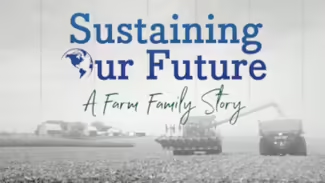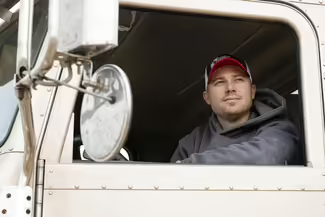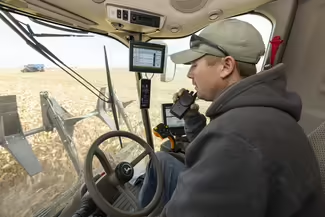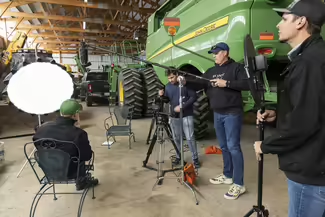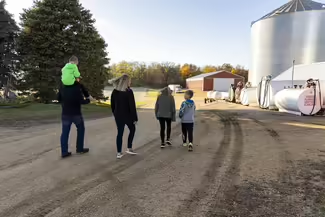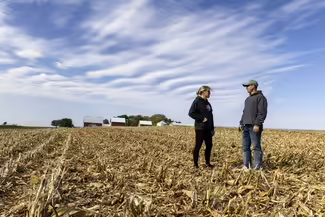
To celebrate our 50th podcast episode, we get behind-the-scenes information about the creation and production of the new Illinois Farm Bureau (IFB) Documentary - Sustaining our Future: A Farm Family Story. Michael Ganschow, Bureau County Farmer, Lauren Lurkins, IFB Director of Environmental Policy, and Scott Anderson, IFB Video Producer, spoke about the goals and desired outcomes that went into its creation.
The Origin
After being hired by IFB in January 2021, Scott attended many field days throughout the year recording the event speakers. These speakers included academia, IFB staff, the occasional politician, and the farmer hosting the field day, discussing the implemented conservation practice and its function for nutrient loss reduction. Hearing the passion and emotion from the farmer regarding conservation and how much it meant to implement different practices, Scott wanted to find a more compelling way to share the information and story beyond the field day; not only with other farmers around Illinois but also consumers to explain the complexities of farming, nutrient loss, and sustainability. What started as an idea for a docuseries transformed into a documentary – a first for IFB.
The Story
Michael felt like the message came across as they intended, but the way that it progressed was different than what was anticipated, and it turned out better than they could have expected. The story is family and conservation-focused, going back three generations. Conservation began with his grandfather, Dean, adopting no-till and reduced till as an early adopter in Illinois while facing a lot of criticism. The conservation story continued with his father, James, who continued to take agricultural conservation to the next level by having confidence and trying new things. Michael talked about how fortunate he felt to grow up in a conservation-focused operation and how that gave him the opportunity to continue the progression of conservation and their family’s legacy. Michael gives credit to Scott for his vision and his ability to ask perceptive questions to tell the Ganschow story.
The Research
Scott points out that there are a lot of misconceptions about farmers not wanting to change or listen to scientific research, which is why it was important to include two University of Illinois professors, Dr. Andrew Margenot and Dr. Kaiyu Guan, in the telling of this conservation story. Dr. Margenot and Dr. Guan have partnered with IFB in the past to communicate and connect with farmers regarding research opportunities. Both have a history of sharing their scientific findings with farmers. As Lauren points out, we won’t get far on any of these environmental issues without finding a way to progress the research being done and communicating back to the farmers for them to consider changing or implementing practices. This documentary is just one example of showing how scientists are working with farmers to promote and progress conservation and nutrient loss reduction.
The Reach
To date, the documentary has received over 25,000 views and has been shared with a variety of groups beyond the IFB including the US EPA, Illinois EPA, and Illinois Department of Ag. Michael says that part of the hope and dream of this documentary is to reach out to other growers, especially those on the fence about trying new practices while explaining the importance of implementing conservation for sustainability. There is also the understanding that what works for one farm doesn’t always work for another, so the conservation practices adopted need to address the goals of the farmer and what works best for their operation. Michael implements practices he thinks and hopes are correct with the hope his neighbors ask him about them while shaking off any potential criticism. While Michael admits that not everything always works out, the largest opportunities to learn and grow often come from the biggest failures. Scott’s desire for the documentary is that it is created in a way that reaches out to farmers but is still easily digestible for those who don’t have an agricultural background.
The Response
A preview of the documentary was initially shown at the 108th Annual Business Meeting in December, and many in attendance went back to their hotel rooms at the conclusion of the day to watch it in its entirety. Board members realized that the documentary had hit on something special. Illinois Farm Bureau members acknowledge that this is something they have been requesting for years – a way to share the story of their families, farms, and dedication to conservation.
The full documentary on the Ganschow family and their focus on conservation, sustainability, and nutrient loss over three generations can be found on the Illinois Farm Bureau’s website and on their YouTube channel. To listen to the full podcast interview and get more behind-the-scenes information, go to go.illinois.edu/NLRS_episode50.
ABOUT THE AUTHORS
Rachel Curry is a Watershed Outreach Associate for two Nitrogen Priority Watersheds (Flint-Henderson and Lower Rock River Watersheds) and is housed in the Galva office of the Henry, Mercer, Rock Island, and Stark Counties Extension Unit. Rachel earned a BS in Environmental Studies from Knox College and an MS in Environmental Science and Soil Science from Iowa State University with an emphasis on soil fertility. She is interested in sharing information on the Illinois Nutrient Loss Reduction Strategy and agricultural conservation practices through discussion and outreach.
Nicole Haverback is a Watershed Outreach Associate for two Phosphorus Priority Watersheds (Embarras and Little Wabash River Watersheds) and is housed in the Effingham office of the Clay, Effingham, Fayette, and Jasper Counties Extension Unit. Nicole earned a BS in Agriculture and Rural Policy Studies from Iowa State University in May of 2022. She is interested in sharing information on the Illinois Nutrient Loss Reduction Strategy and agriculture conservation practices through discussion and outreach.
ABOUT THE BLOG
At Illinois Extension, we’re working to improve water quality at home and downstream. Every month, our watershed outreach associates will bring you stories highlighting agricultural conservation practices, current research projects and results, and from the field farmer interviews. The Nutrient Loss Reduction blog covers conservation practices recommended by the Illinois Nutrient Loss Reduction Strategy, timely updates, farm safety, and new decision tools to help farmers and producers reduce the nutrients leaving their field. Want to get notified when new blog posts are available? Subscribe at go.illinois.edu/SubscribeINLRS.
